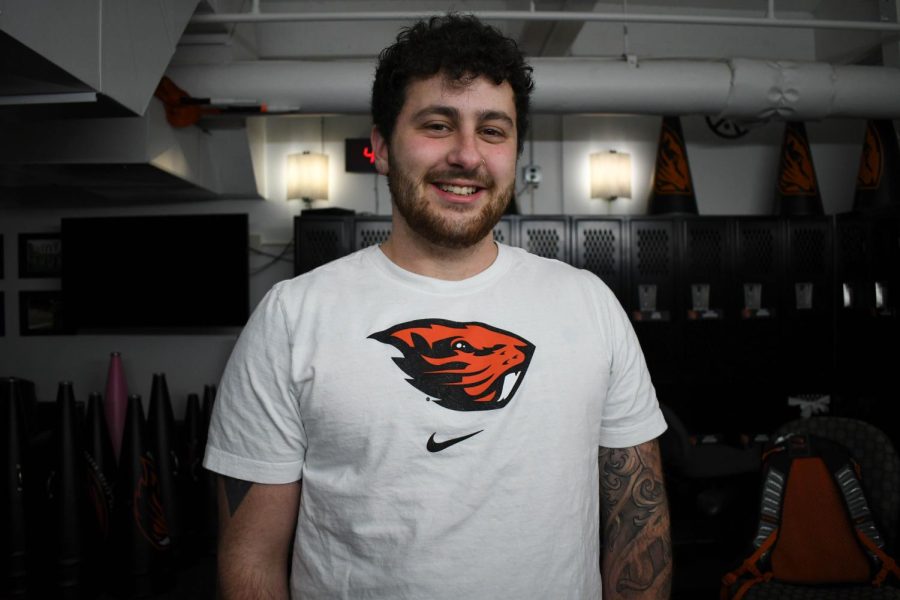Cochener aims to break barriers for transgender athletes
Oregon State University cheerleader Oliver Cochener posing in the OSU cheer locker room in Corvallis, Ore. on March 30. Cochener is OSU’s first and only transgender cheerleader, and hopes to bring awareness towards transgender athletes around the country.
April 4, 2022
With a new gender, new pronouns and new identity, it takes a brave individual to live out their changed identity in a world that is not quite as open-minded as one would like it to be.
Oliver Cochener is Oregon State’s first and only transgender cheerleader. He is a 22-year- old student on the pre-med track, hoping to attend medical school after his time at OSU.
Cochener began his journey as a collegiate- level cheerleader during his first year at a university on the opposite side of the sidelines.
“I used to be in the marching band at the University of Oregon,” Cochener said. “I was sitting in the stands during a football game, and I saw the cheerleaders down at the edge of the field. I was like ‘Oh, that looks fun!’ So, I decided to quit marching band and became a college cheerleader.”
Even though his entrance into the world of cheerleading happened somewhat recently, Cochener knew he was a part of the LGBTQ+ community early on in his life. When asked about when he knew he wanted to be different from what he was born biologically, Cochener answered with “always.”
“I just enjoyed boy’s toys as a kid and always wanted to dress masculine,” Cochener said. “I
think I knew for sure that I wanted to [transition] around the age of 12. I initially went to private school all the way up until middle school, so I didn’t really know that the LGBTQ+ community was a thing.”
So now, Cochener, who identifies as male and uses he/him/his pronouns, is a proud cheerleader. But despite the good times he has experienced living his life authentically, there have been plenty of hardships as well. Aside from the many injections and surgeries he went through to physically transition, when asked what the hardest part about the transition process was, he said that it was the judgment of others.
“No matter what age it’s been, no matter where I go or what I do, people always have nasty things to say,” Cochener said. “Of the things I’ve gone through, it’s just a constant thing, you know? You see it when other athletes succeed, you’re gonna see it anywhere and everywhere. Even if it’s not about you. It’s kind of about you”.
This can be seen in the backlash trans athletes experience in the world of sports. A well- known example is Lia Thomas’s experience as a transgender woman and athlete. Thomas was a Penn State University swimmer who became the first transgender athlete to win a Division- One National Title.
Cochener said he believes that those advocating for transgender athletes to be prohibited from competing are actually contributing to the problem.
“My biggest thoughts are with such regula- tions on all of those things that people seem to want, it’s actually affecting the women in those sports more than it’s helping in any way that they see fit,” Cochener said. “I mean, you’re seeing women being turned down from being able to compete because they have too high levels of testosterone that’s naturally occurring. So, I think it’s a little ridiculous that people try to gatekeep those kinds of things when obviously, the NCAA has done their due diligence to already best serve the transgender community”.
Something that has helped Oliver with the trials and tribulations has been the sport itself. “I have found that every time I go do cheer, nothing else matters,” Cochener said. “Like what you’re doing at that moment, really is what’s important. So, it’s easy to forget about those kinds of things. It’s been a pretty welcoming community overall to go into.”
In regards to any athlete who wants to transition, but is nervous or scared, especially as a student-athlete, Cochener said they should just do it.
“I know that it’s terrifying and there’s moments where you really question a lot of things,” Cochener said. “But you never know until you do it. Every single day will present a different kind of challenge. And if you already feel that way internally, you’re either going to have to sit in the discomfort of feelings that way and never transition. Or you’re going to find comfort in yourself and experience slight discomfort from those around you.”



















































































![Newspaper clipping from February 25, 1970 in the Daily Barometer showing an article written by Bob Allen, past Barometer Editor. This article was written to spotlight both the student body’s lack of participation with student government at the time in conjunction with their class representatives response. [It’s important to note ASOSU was not structured identically to today’s standards, likely having a president on behalf of each class work together as one entity as opposed to one president representing all classes.]](https://dailybaro.orangemedianetwork.com/wp-content/uploads/2025/03/Screenshot-2025-03-12-1.00.42-PM-e1741811160853.png)
























